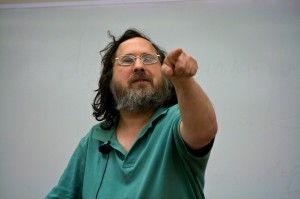Wired has a great piece online in which journalist Steven Levy looks back on the flowering o the Information Age 25 years after the publication of his landmark book, Hackers: Heroes of the Computer Revolution.
Back in the good old days hackers weren’t criminals stealing and spying; they were the nerdy genius programmers who remade the way we think, live and communicate. Levy looks back at the monsters of the industry who became household names–Gates, Wozniak, etc.–but also revisits some of those who never spent time hanging with Bono or dancing with the stars.
One passage that’s particularly interesting focuses on legendary hacker Richard Stallman, a brilliant and belligerent soul who despises the commercialization of what the geeks brought to life. An excerpt about him from Levy’s Wired article:
“I first met Richard Stallman, a denizen of MIT’s AI Lab, in 1983. Even then he was bemoaning the sad decline of hacker culture and felt that the commercialization of software was a crime. When I spoke to him that year, as the computer industry was soaring, he looked me in the eye and said, ‘I don’t believe that software can be owned.’ I called him ‘the last of the true hackers’ and assumed the world would soon squash him.
Was I ever wrong. Stallman’s crusade for free software has continued to inform the ongoing struggles over intellectual property and won him a MacArthur Foundation ‘genius grant.’ He founded the Free Software Foundation and wrote the GNU operating system, which garnered widespread adoption after Linus Torvalds wrote Linux to run with it; the combination is used in millions of devices. More important, perhaps, is that Stallman provided the intellectual framework that led to the open source movement, a critical element of modern software and the Internet itself. If the software world had saints, Stallman would have been beatified long ago.
Yet he is almost as famous for his unyielding personality. In 2002, Creative Commons evangelist Lawrence Lessig wrote, ‘I don’t know Stallman well. I know him well enough to know he is a hard man to like.’ (And that was in the preface to Stallman’s own book.) Time has not softened him. In our original interview, Stallman said, ‘I’m the last survivor of a dead culture. And I don’t really belong in the world anymore. And in some ways I feel I ought to be dead.’ Now, meeting over Chinese food, he reaffirms this. ‘I have certainly wished I had killed myself when I was born,’ he says. ‘In terms of effect on the world, it’s very good that I’ve lived. And so I guess, if I could go back in time and prevent my birth, I wouldn’t do it. But I sure wish I hadn’t had so much pain.'”
Tags: Richard Stallman, Steven Levy

